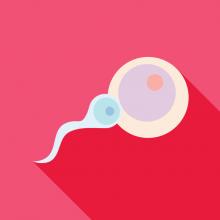Infertility: Is it Really "Unexplained?"

What you see below isn’t so much of a blog post per se—it used to be one of our primary practice areas on this page. We’re still very knowledgeable about holistic fertility support and can help women who are struggling to conceive, but have found that many of our clients are struggling with getting pregnant in the context of our primary areas of practice.
In an effort to distill things down to what we’ve become known for and what really fires us up, we’ve chosen to put this information on our blog vs. it being a “primary” practice.
* * *
Whether you’re just starting to consider having a baby or you’ve been trying for some time, whether you’re planning on getting pregnant on your own or with the help of Western assisted reproductive technology or Traditional Chinese Medicine, the best thing you can do is to lay healthy groundwork for conception.
If you’ve been diagnosed with “infertility,” it can be devastating. It’s like being told that your body has turned against you—that it has failed at one of the most basic and natural human functions. Searching for answers can be maddening—it can take the joy out of the journey and turn baby-making into a mechanical, data-driven quest versus a gentle discovery of self-awareness and self-care.
So many women (and men) are misinformed—they’re told that there are no solutions. A woman’s luteinizing hormone (LH) and follicle stimulating hormone (FSH) are high. Maybe her Anti-Mullerian hormone (AMH) is low. In Western medicine, these criteria tend to be the end-all-be-all determinants from which a woman’s ability to conceive are determined. (We don’t give these numbers a lot of credence.) And these “diagnoses” can leave women devastated and heartbroken—adding to the stress that may be preventing conception in the first place.
We don’t believe in the ill-fated concept of “unexplained infertility.” According to Dr. Randine Lewis, author of The Infertility Cure, “There is no such thing as infertility. Rarely have I met a woman of childbearing age with all her reproductive organs intact who isn’t capable of bearing children. As long as the anatomical structures are present, a medical diagnosis of ‘infertility’ is often a fallacy. Many factors can cause a woman to have difficulty conceiving, but once these factors are overcome and a woman’s body is restored to health, conception can occur naturally.”
In our experience, some of these complicating factors include stress (often manifesting as adrenal dysfunction) and inadequate nutrition, both of which significantly diminish reproductive capacity. For many women, simply addressing these two areas can result in pregnancy.
Other factors include PCOS (reportedly one of the most common reasons for infertility), hypothyroidism, and autoimmunity.
Hypothyroidism can interfere with the release of an egg from the ovaries (ovulation). If you’re not ovulating, you can’t get pregnant. Also, hypothyroidism and excess estrogen/estrogen dominance often go hand-in-hand. Too much estrogen can also result in fertility challenges.
If you have any manifestation of autoimmunity, whether it’s Hashimoto’s or another autoimmune condition, in some cases, it can thwart the fertilized egg’s ability to implant into the uterine wall. According to the functional medicine community, many women with autoimmunity are, in fact, fertilizing. But the hypervigilant immune system—the same one that is attacking your thyroid in the case of Hashimoto’s, for example—could view the fertilized egg as yet another “invader” and launch an attack on it.
Many in the functional medicine community tell women to manage their autoimmunity before trying to conceive. Most of the time, autoimmune conditions can be managed and people can live symptom-free.
Dr. Lewis continues, “The first step to fertility isn’t another drug or procedure…it’s discovering a new way of thinking about yourself, your body, and your health.”
Add comment